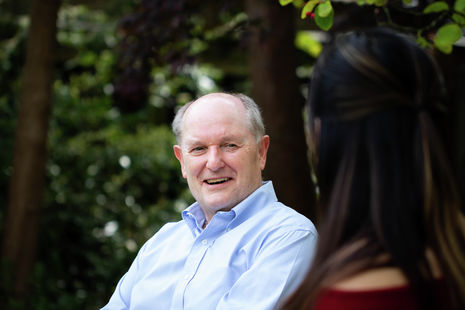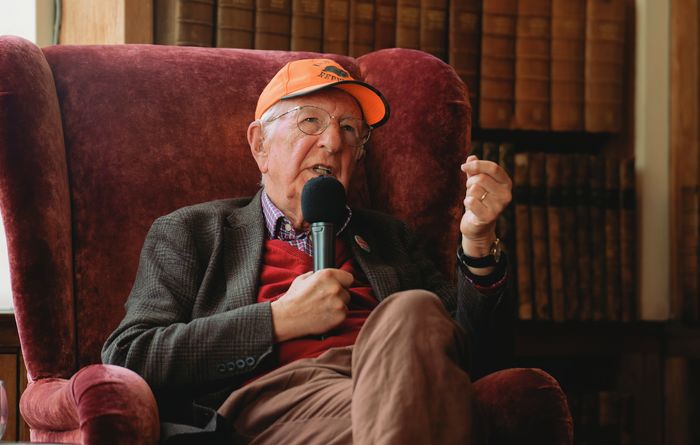Roger Mosey’s farewell to Cambridge
Vienna Kwan sits down with departing Selwyn Master Roger Mosey to discuss belonging in Cambridge, freedom of speech, and the surprising overlaps between leading a college and the BBC

Would Selwyn College Master Roger Mosey fit in as an undergraduate at his own college?
Growing up at Bradford, living above a shop run by his parents, and coming “from a family where nobody had been to university,” Mosey “never felt like an insider” as an undergraduate at Oxford. “One of the challenges for me was coming from the North,” he admits. Looking back, he questions the inadequacy he felt while inside the Oxbridge bubble. “Everybody […] feels that somehow the university is different from them, but […] the one thing I say to everybody is: if we’re not the University of Cambridge, who is?”
Upon his arrival at Selwyn in 2013, his strategy focused on academic excellence, financial stability, and wider engagement. In the 2024 admissions cycle, despite being a relatively new college, Selwyn received more applications than historically prestigious colleges like King’s and Queen’s and ranked third in the Tompkins table – a far cry from its once “poor, out-of-town, academically low” reputation.
“Here, it’s how we make a community work, and it’s how everybody fits together”
During his 12-year tenure, Mosey aspired to turn Selwyn into one of Cambridge’s most inclusive colleges, building on its reputation as “friendly, high-achieving, [and] open”. Under his leadership, the college now has one of Cambridge’s highest percentage of home students from state schools (roughly 80%), and tripled the percentage of home students from minority backgrounds. So, the answer is yes: present-day Mosey would have looked out for teenage Mosey. He would have fit in.
Being an outsider didn’t deter Mosey on his return to university life. “I was really the first media person to come here, apart from […] John Tusa in the 2000s.” When Selwyn was searching for a new Master back in 2013, they were looking for a “Cambridge-based academic”. Mosey, the former Head of BBC News and Director of Sport, was neither.
Yet, as Mosey discovered, the worlds of broadcasting and college-mastering unexpectedly overlap. In both pursuits “You have to make sure the reality of what you do is the most important thing,” he explains. It’s about “that sense of communicating” with your audience, and letting them “know who we are”.
Unlike the spotlight of the BBC, where accolades are personal, Mosey saw the Master’s role as collective. He wasn’t seeking a job that was “interesting, stimulating, [or] fun” for him, instead focusing on what the College delivers for all. “That’s rather different […] from broadcasting, where you know you can go and win an award for your journalism […] which is all about you. Whereas, here, it’s how we make a community work, and it’s how everybody fits together.” The most rewarding part? Seeing “people grow in confidence and go out into the outside world and do amazing things”.
"Dialogue is really important. You need to hear other people’s points of view"
‘Helping people to do amazing things’ is certainly an attractive job description, but Mosey is quick to re-emphasise that the College is not just about him, but the 700 individuals who make up its community.
Throughout his Cambridge career, the ex-broadcaster has remained a stalwart defender of free speech. “The journalist in me and the Cambridge Master in me thinks that dialogue is really important. You need to hear other people’s points of view,” he explains. Under Mosey, Selwyn has hosted dialogues on topics such as the US presidential election, democracy, and assisted dying. His strong commitment to uphold the freedom of speech landed him in national headlines and hot water, maintaining a willingness to engage with and debate the most controversial of perspectives.
Mosey recalls sitting in the Oxford Union as a student listening to Richard Nixon speak, four years after Watergate. “He had one of the best political brains albeit […] warped and a bit corrupted”, he laughs. Being able to “sit for an hour and listen” to an opposing viewpoint remains, in his view, a vital skill.
He claims he will always hold onto fond memories of Selwyn. He will always remember his basset hounds, YoYo – who passed away a year ago – and Isla, running through the Master’s garden. “Come graduation day, when there would be around 100 people in the Master’s garden, she (YoYo) knew it was her big moment […] to be petted and stroked by everybody.” Interestingly, because Selwyn Masters are technically banned from owning dogs, YoYo was formally registered by Selwyn Council as ‘a very large cat’. He will always remember the “utterly beautiful” harmonies of the choir echoing from within the chapel, and how, during the pandemic, Selwyn “never closed our catering”. At one point, the hall transformed into a makeshift convenience store, offering necessities from carrots to toilet rolls.
As Mosey begins his next journey as a freelance writer in London writing about higher education and the BBC, he reflects on what he might say to his past-self on his first day as Master: “You go to more dinners than you can imagine […] so go easy on the pudding and don’t drink too much.”
So, would Roger Mosey fit in at Selwyn as an undergraduate today?
The answer, still, is yes – perhaps even more so now. The college he helped shape is one where a student from Bradford, unsure of his place in the Oxbridge world, would find acceptance and belonging. He never felt like an insider, but today, the college he helped shape is one where insiders are made – not by pedigree, but by purpose. If we’re not the University of Cambridge, who is?
 News / Colleges charge different rents for the same Castle Street accommodation2 March 2026
News / Colleges charge different rents for the same Castle Street accommodation2 March 2026 News / King’s hosts open iftar for Ramadan3 March 2026
News / King’s hosts open iftar for Ramadan3 March 2026 Theatre / Lunatics and leisure centres 4 March 2026
Theatre / Lunatics and leisure centres 4 March 2026 News / Angela Merkel among Cambridge honorary degree nominees27 February 2026
News / Angela Merkel among Cambridge honorary degree nominees27 February 2026 News / News in Brief: waterworks, wine woes, and workplace wins 1 March 2026
News / News in Brief: waterworks, wine woes, and workplace wins 1 March 2026








